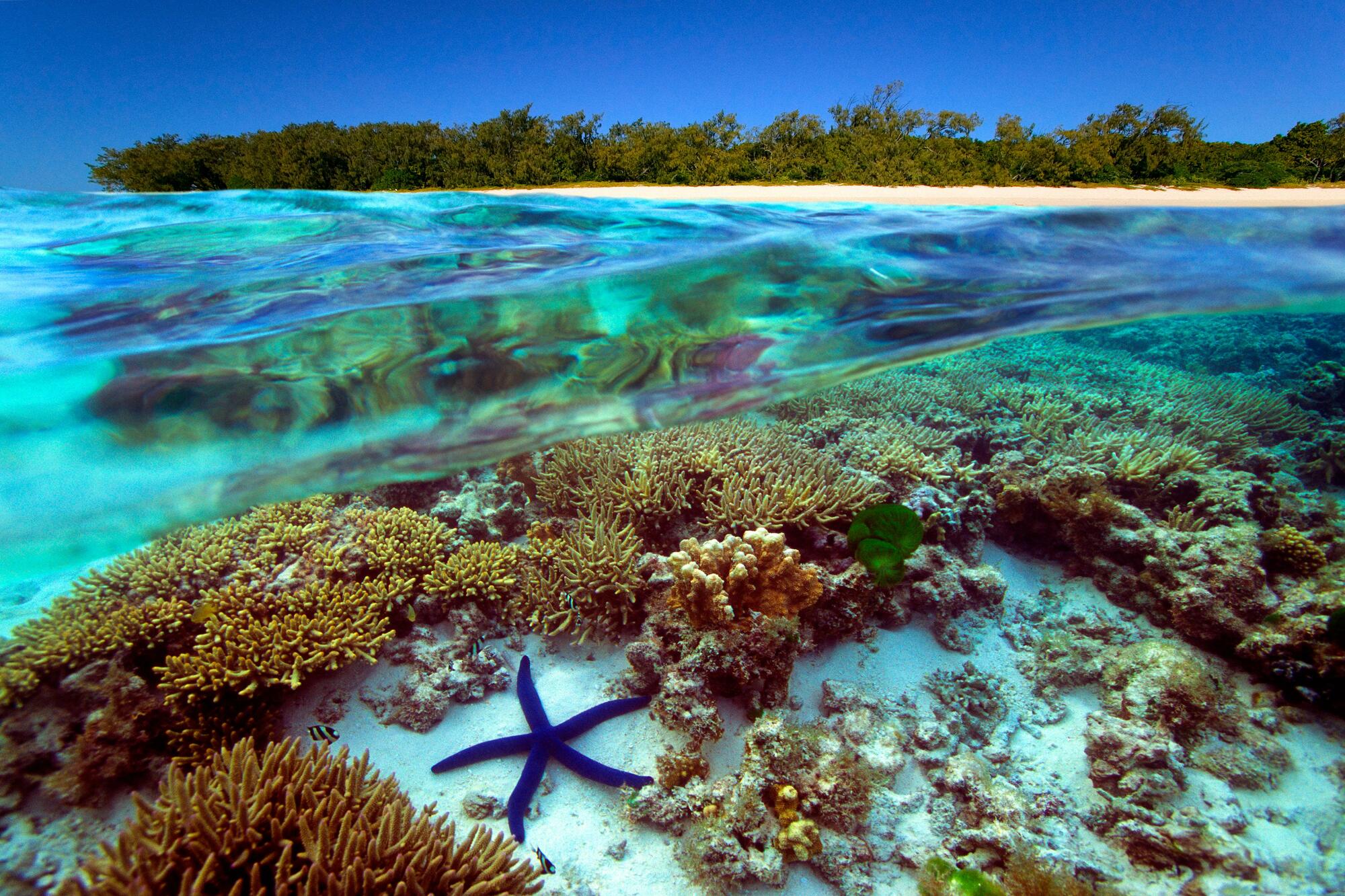Pamukkale is a town in the Denizli Province of Western Turkey that is famous for the nearby travertine terraces and mineral-rich geothermal springs. In Turkish, Pamukkale means ‘cotton castle’, and refers to the bright white rock formations that the area is so well known for.
These other-worldly vistas of glittering white terraces are the result of the calcite-rich waters that flow from the hot springs and drip down the mountainside. Gradually, over tens of thousands of years, the mineral-rich spring water deposits layers of carbonate minerals on slopes below, leaving behind the remarkable travertine terraces.
The incredible landscapes of Pamukkale contain numerous hot springs, pools, and waterways. You can swim in some of the deeper pools or, if you’d prefer to relax and unwind, you can simply bathe in the invigorating waters of the springs.
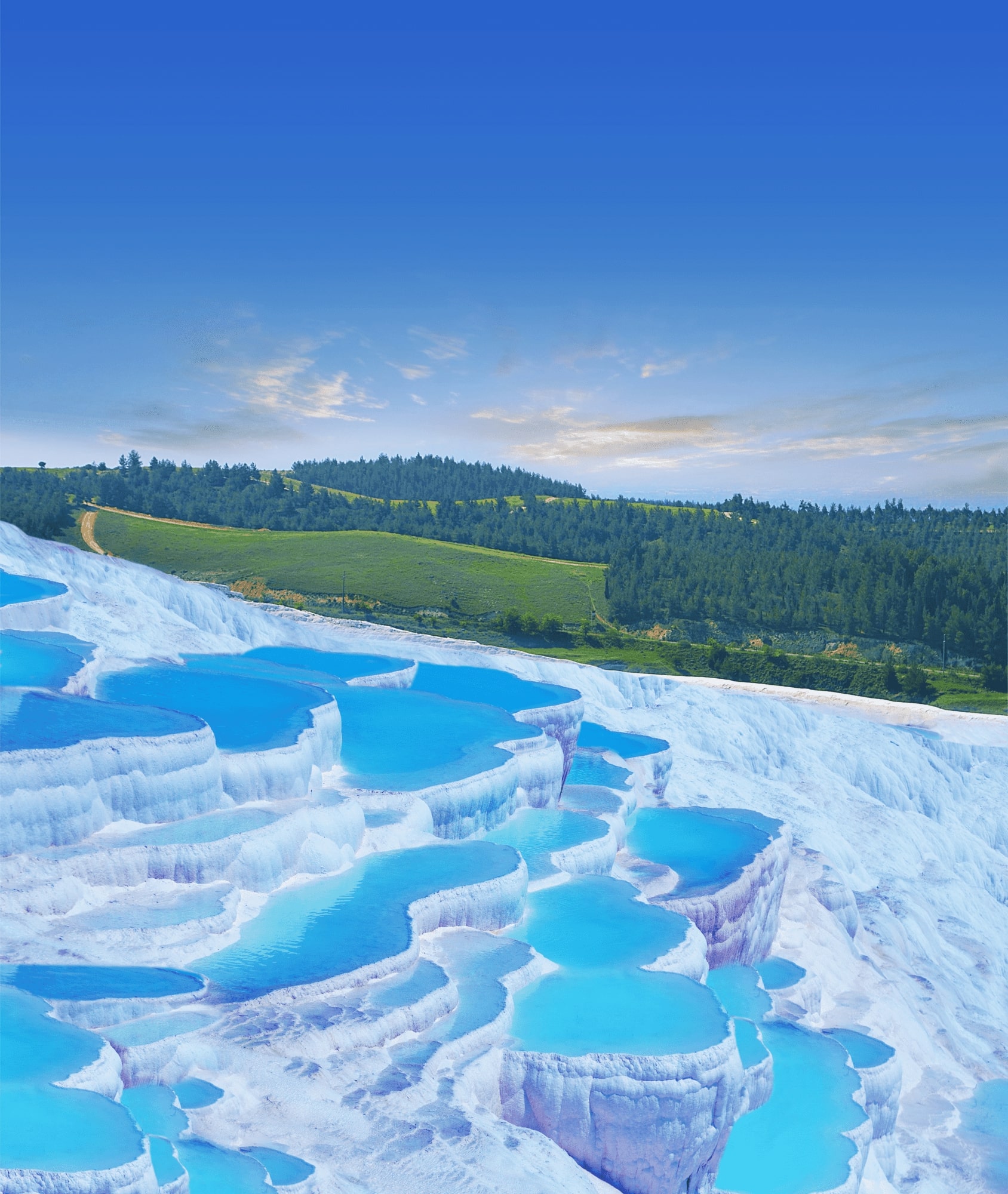
Pamukkale was once the site of Hierapolis, an ancient Roman Spa town and significant center of regional trade and culture. Today, you still explore the ruins of the town, visit the local museum, and see the remains of a well-preserved theater and necropolis.
Officially designated a UNESCO World Heritage Site in 1988, Pamukkale, and the nearby ruins of Hierapolis, are the perfect place to spend an unforgettable time with your friends or family in Turkey’s beautiful River Menderes Valley.
How To Get To Pamukkale
Pamukkale is located in the Inner Aegean region of Turkey. The easiest way to get to Pamukkale is to fly into the Istanbul International Airport. The Istanbul International Airport is a major regional transport hub, so you’ll have no problems catching a direct flight from Europe, the US, or Asia.
Once you reach Istanbul, you can fly onwards by taking a 1 hour domestic flight to the Denizli Cardak Airport in the city of Denizli. From Denzili, there are excellent transport links to take you the final 65 km to Pamukalle.
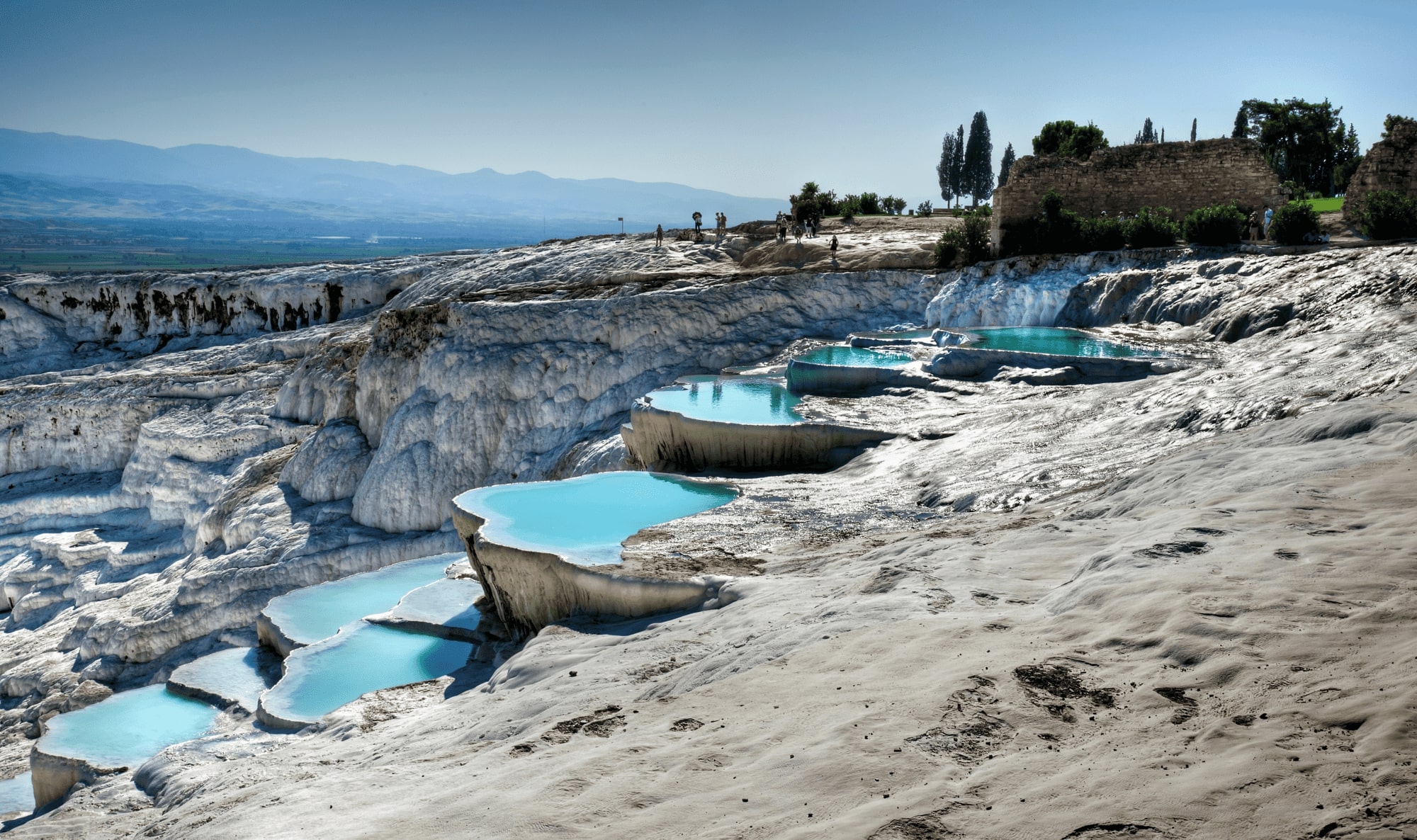
To get from Denizli to Pumakkale, you can hire a car and drive or make use of the local public transport network. For instance, you can catch a local bus to Pumakkale which will take around 30 minutes, or, if you prefer, you can hire a private taxi to take you on the last leg of your journey.
What’s The Best Time To Visit Pamukkale?
The ideal time of year to visit Pamukkale is during the spring, between April and June. With clear blue skies and sunshine, temperatures range between 20 to 30 Degrees Celsius during the day. Alternatively, you can visit during the autumn months, between September and November, which have similar weather conditions to the springtime with slightly cooler temperatures.
It’s best to avoid the peak of the summer for your visit. Not only can temperatures be oppressively hot but there’s also a lot more tourists in the area and hotel prices tend to be a little higher as well.
When planning your visit to the hot springs in Pamukkale, it’s great if you can visit in the early morning or evening, when temperatures are cooler and there’s fewer people around. You can also time your trip for a weekday to avoid the weekend crowds in the hot springs.
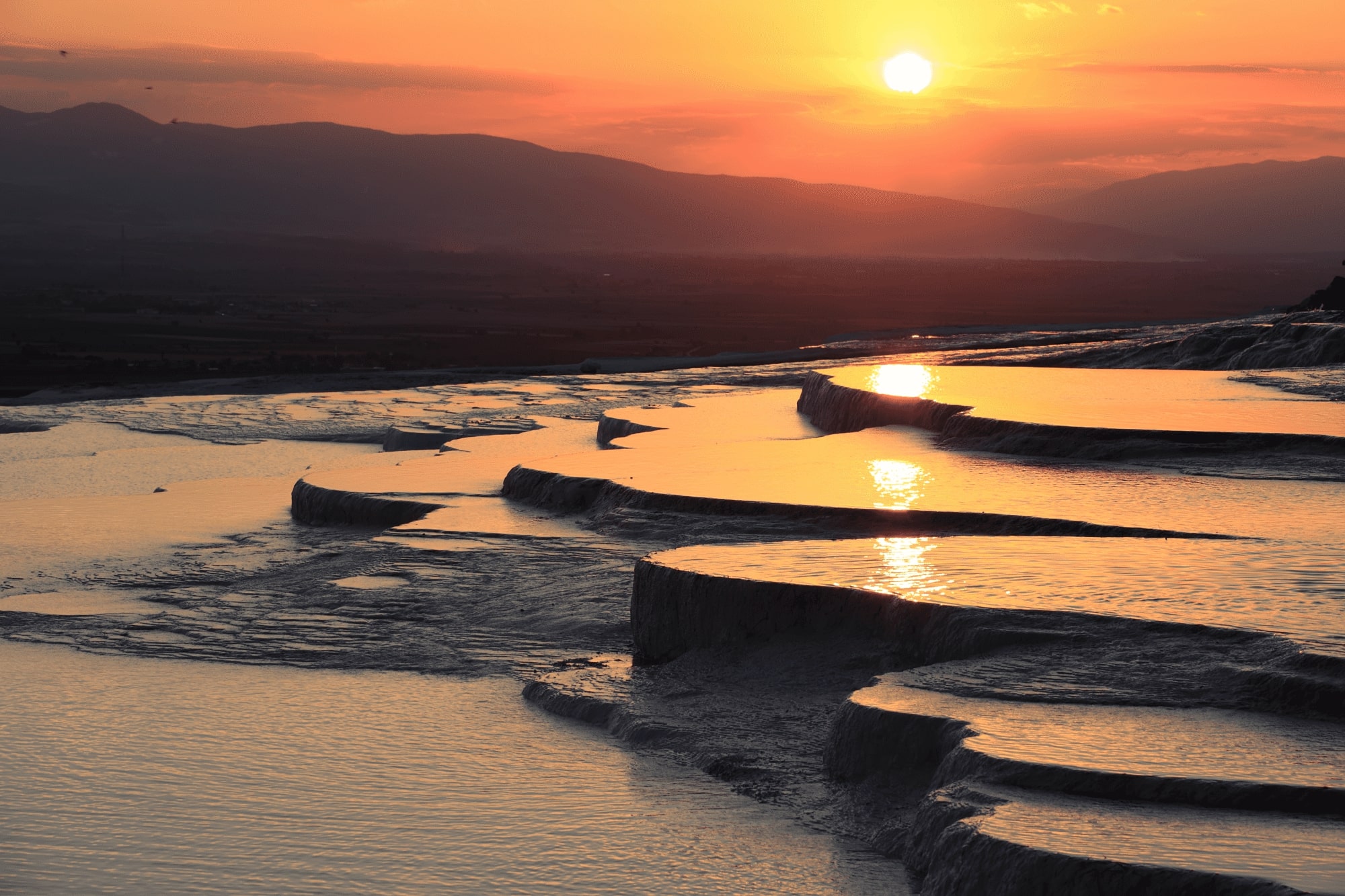
What Is There To Do At Pamukkale?
Visit the Travertine Terraces, Hot Springs and Pools
Amongst the dazzling white travertine terraces of Pamukkale, you’ll find a whole selection of hot springs and outdoor swimming pools – a truly magical spot for relaxing and rejuvenating in the therapeutic waters of the mountain springs. And with fantastic views into the valley below, it’s easy to see why these hot springs have attracted visitors from far and wide since the earliest days of Ancient Rome.
Situated above Pamukkale’s white travertine pools, Cleopatra’s Antique Pool is a modern spa facility with changing rooms, lockers, toilets, and a shaded seating area for relaxing beside the waters. The pool, surrounded by submerged Roman ruins, was once part of a Roman Temple to Apollo, and was even visited by Cleopatra herself!
It’s easy to get to the travertine terraces and Cleopatra’s Antique Pool from the center of Pamukkale town. You can either jump on a local bus, hire a taxi, or join a group tour that picks you up from your hotel.
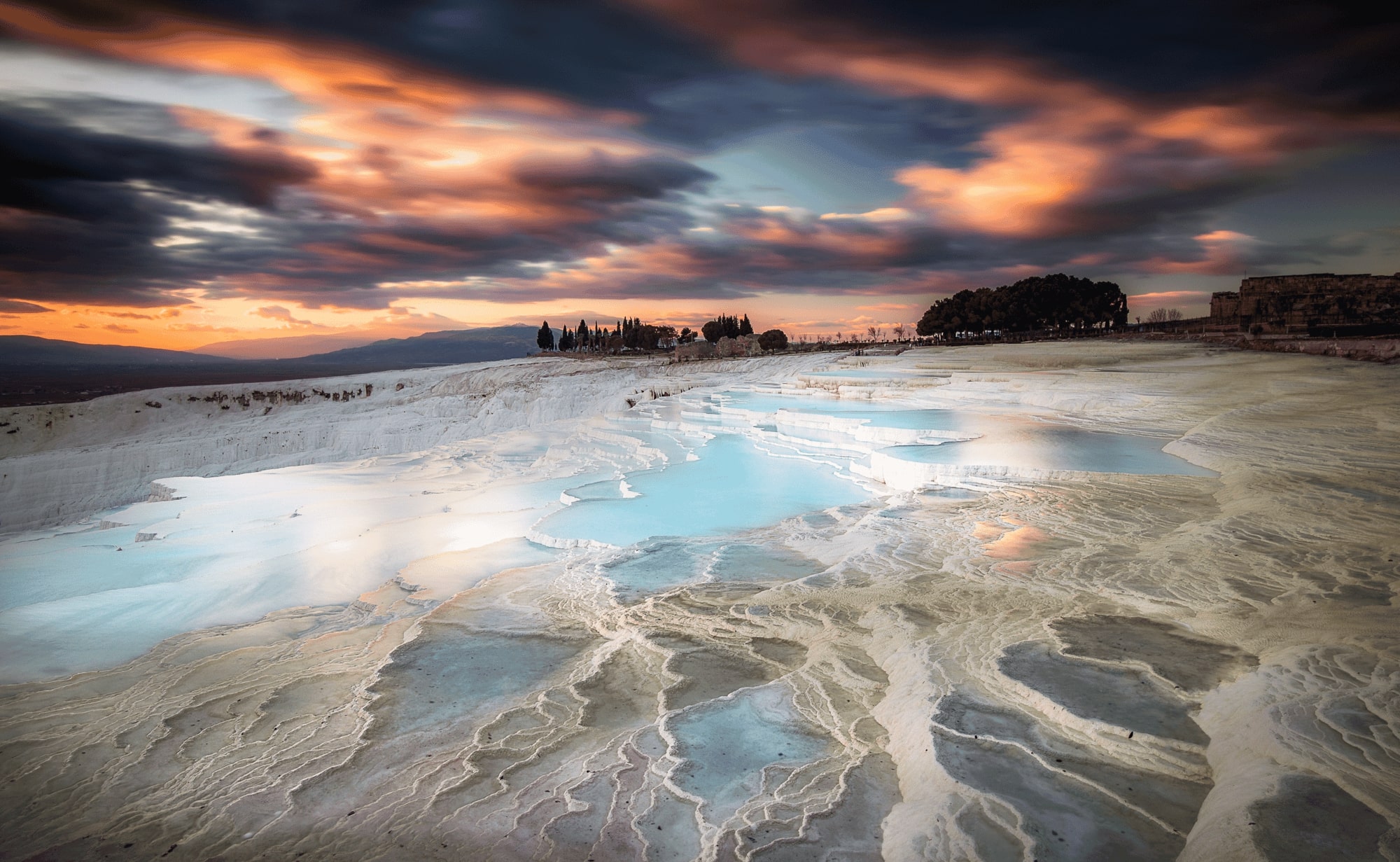
Explore the Ancient Roman City of Hierapolis and the Archeological Museum
If you’d like to learn about the incredible history of Hierapolis, Pamukkale, and the nearby hot springs, then the Archeological Museum is a must-see. Situated in a converted Roman bath house, the museum showcases a wide range of artifacts that include Bronze Age, Roman, and Byzantine era displays. The fascinating exhibits include ancient statues, intricately carved sarcophagi, priceless jewelry, and Roman-era household items, reliefs, and well-preserved works of art.
During your visit, you can also wander through the ruins of the city of Hierapolis, where you can see the remains of a Roman theater, necropolis, and a free-standing monumental archway. An ideal day trip for families, groups of friends, couples, and solo travelers, no visit to Pamukkale would be complete without spending a day in the ancient city of Hierapolis.
Get A Bird’s Eye View with a Hot Air Balloon Ride Over Pamukkale
There’s no better way to experience the breathtaking landscapes of Pamukkale and the surrounding areas than to hop aboard a hot air balloon, and drift through the skies while sipping chilled champagne! So why not sign up for a once-in-a-lifetime hot air balloon ride that will take you over the ruins of Hierapolis and the Pamukkale countryside?
You’ll see the Roman ruins of Hierapolis and snow white travertine terraces from a whole new perspective, as you take in the majestic scenery of the valleys below. This one hour tour includes a hotel pick-up and drop-off 30 minutes before your flight time, champagne, and even a commemorative certificate to remember the day by.
You can find out more about the hot air balloon ride, or reserve your tickets, here.

Private Tour of Ephesus and the Temple of Artemis
After an early morning pick-up from your hotel, you’ll be driven in an air-conditioned vehicle to the city of Ephesus, one of the most famous cities of the ancient world. Home to the Temple of Artemis, one of the 7 Wonders of the Ancient World, Ephesus played an incredibly important role in the Roman era.
In fact, Ephesus was one of the earliest centers of Christianity, containing one of the 7 churches mentioned in the Bible’s Book of Revelations. It was also a bustling merchant city and a major trading port in the region.
During the full-day trip, you’ll visit the Celcus library, the Temple of Hadrian, the Temple of Artemis, the fountain of Trajan, and several unique sites of Christian pilgrimage. And when it’s time for lunch, you’ll be treated to a delicious open buffet of traditional Turkish food in a charming local restaurant. After a magical day of exploration, you’ll be dropped off back at your hotel.
You can find out more about the full-day private tour of Epheseus and the Temple of Artemis, and book your tickets, here.
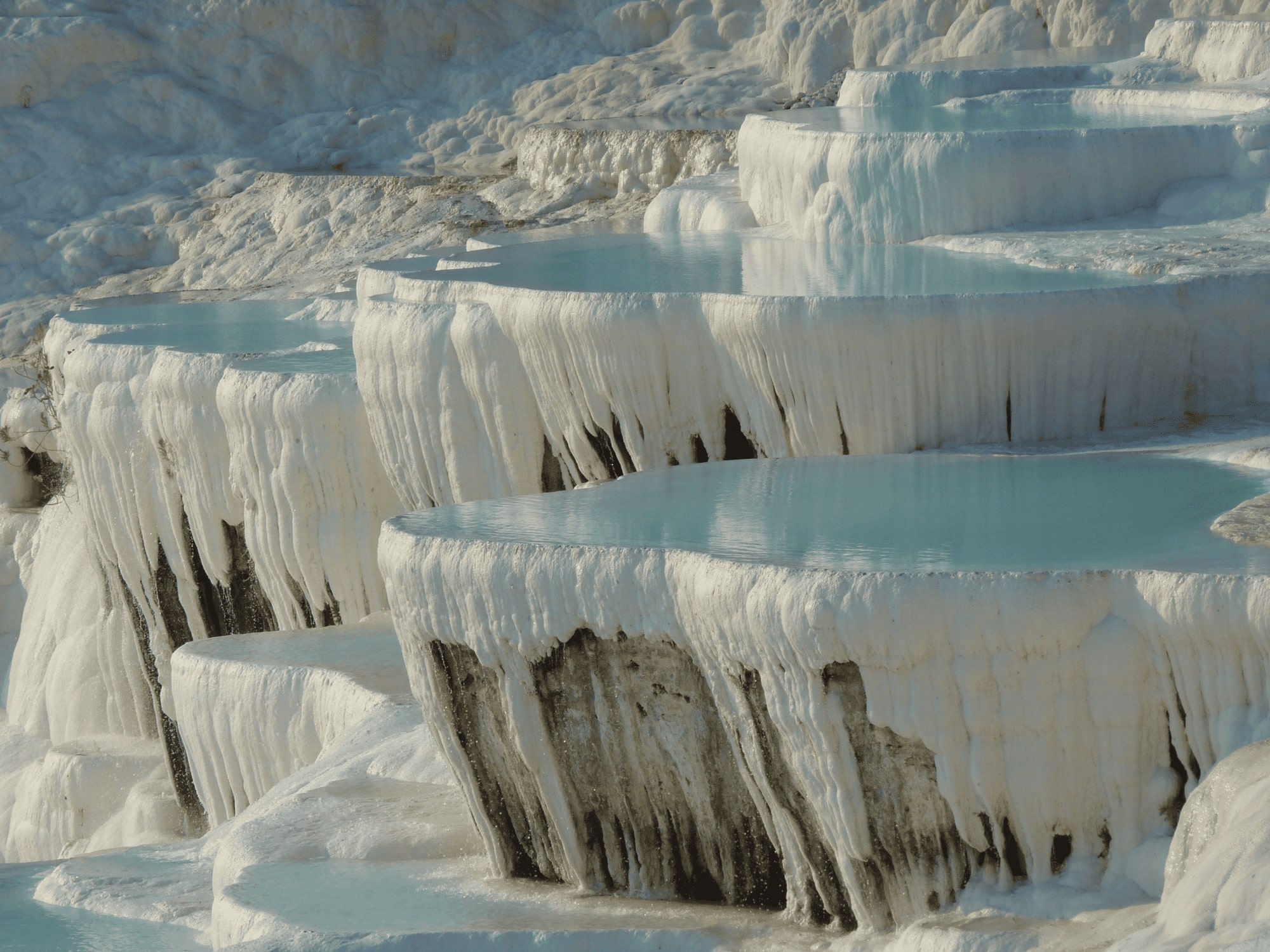
Stay at the Pamukkale White Heaven Suite Hotel
Located right in the heart of Pamukkale, the White Heaven Suite Hotel offers a wonderful sanctuary amongst peaceful gardens overlooking the countryside below. The hotel also runs a free shuttle service to the Pamukkale travertine terraces, just a few km away, and provides a 24 hour front desk service to its guests.
The hotel has a large outdoor sun terrace and dining area, an outdoor pool, free Wifi throughout, an a-la-carte restaurant, a bar and lounge, and a great selection of rooms at prices that are hard to beat. All of the rooms have a mini-bar, flat-screen TV with satellite, and a private bathroom with free toiletries.
You can also arrange activities such as hot air balloon rides, paragliding, visits to the aqua park, and tours of the area with the concierge at the reception. What’s more, you can start each day with a delightful breakfast on the sun terrace!
You can find out more about the White Heaven Suites Hotel, and reserve your room, here.




